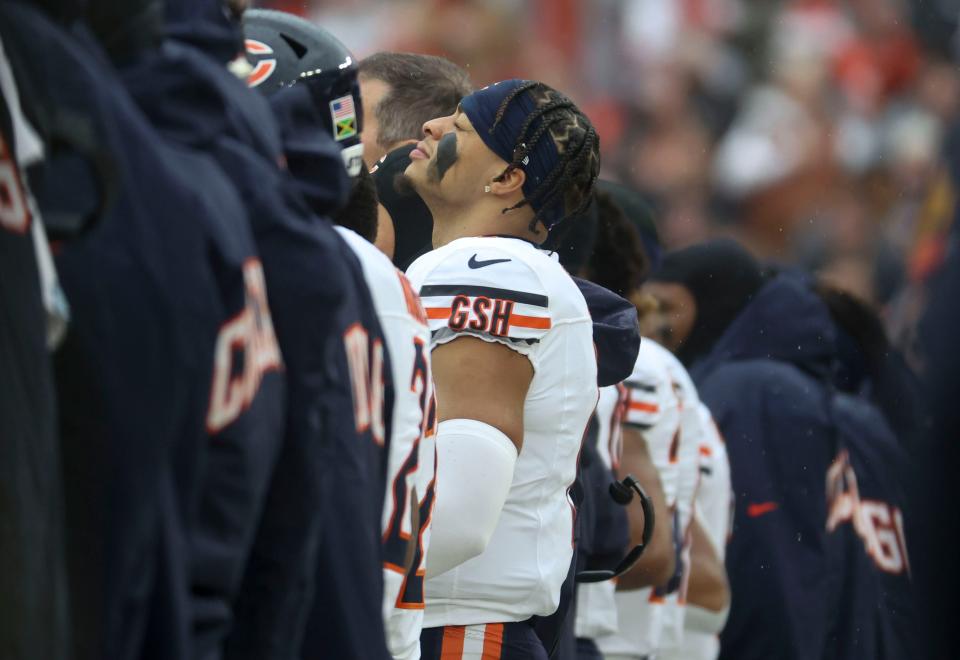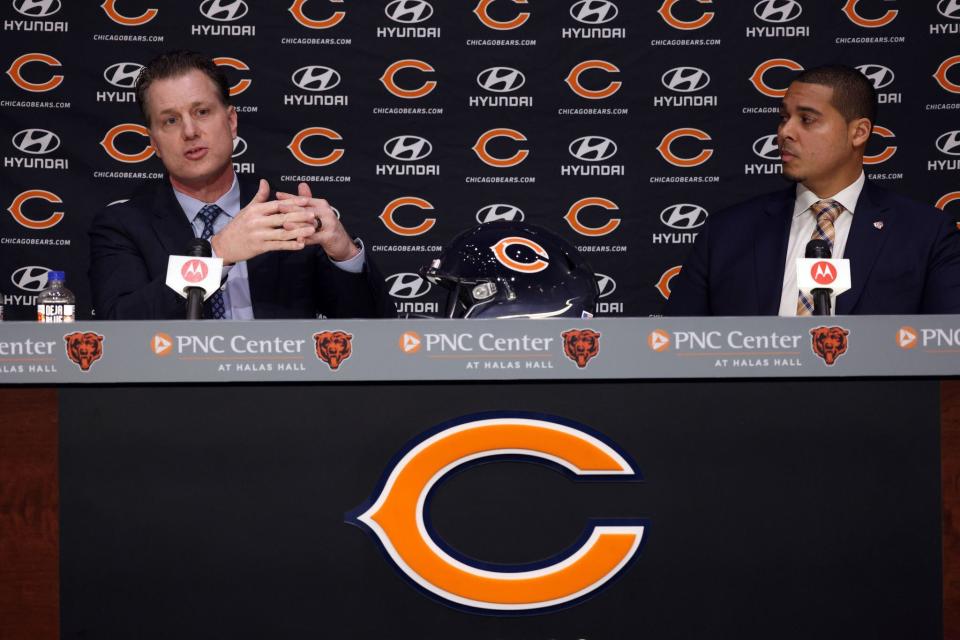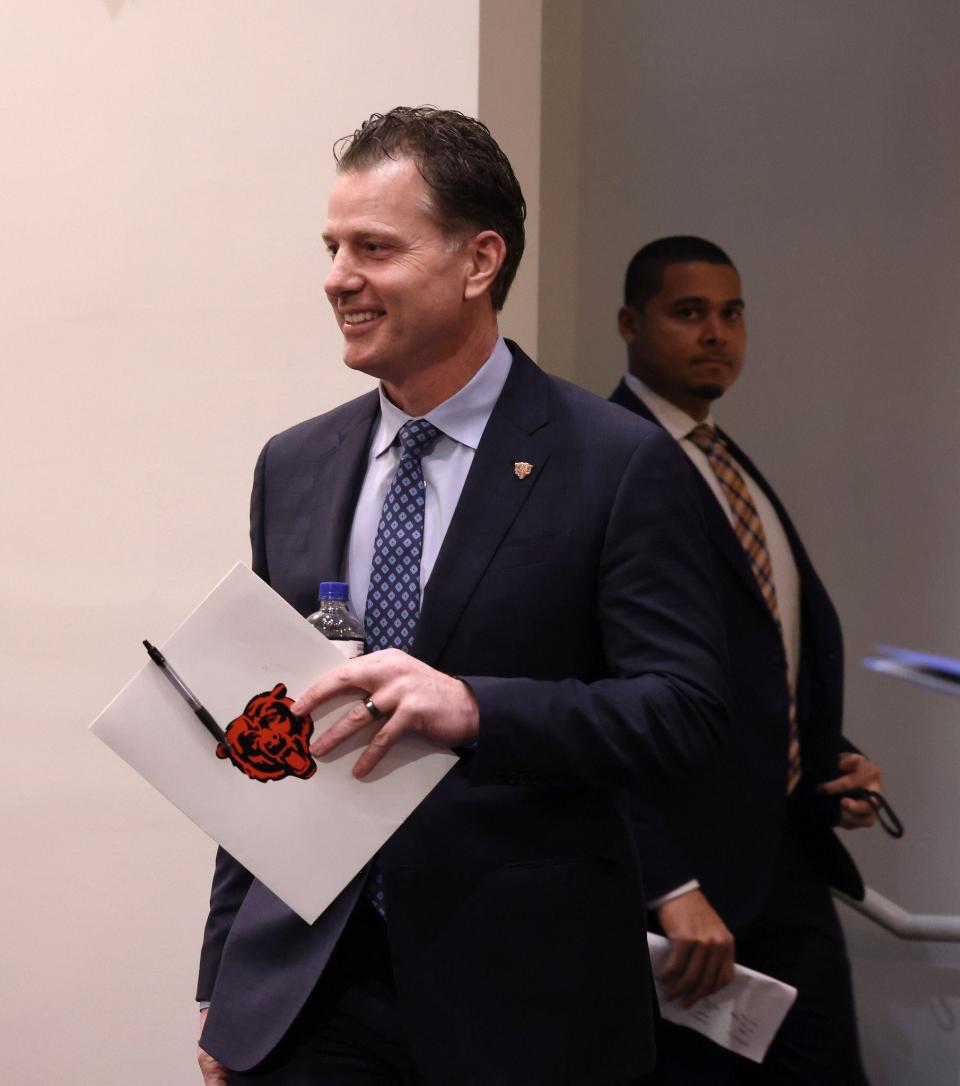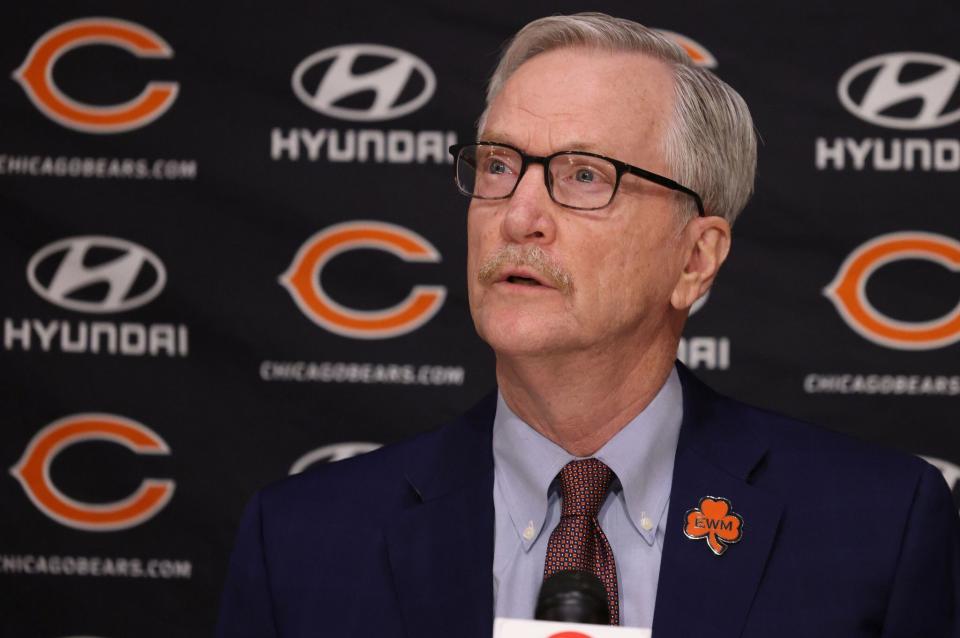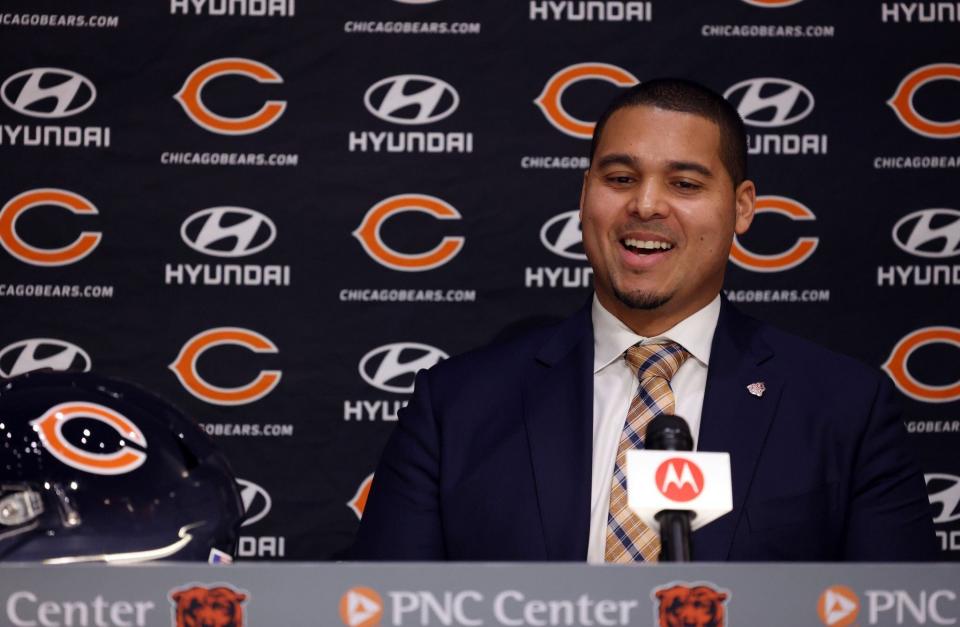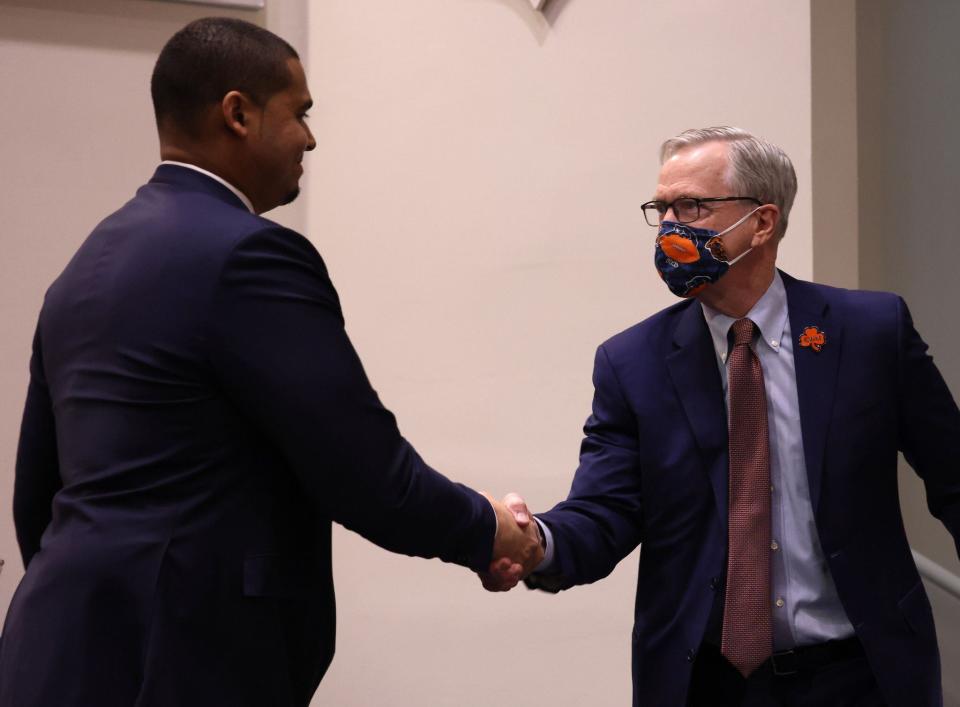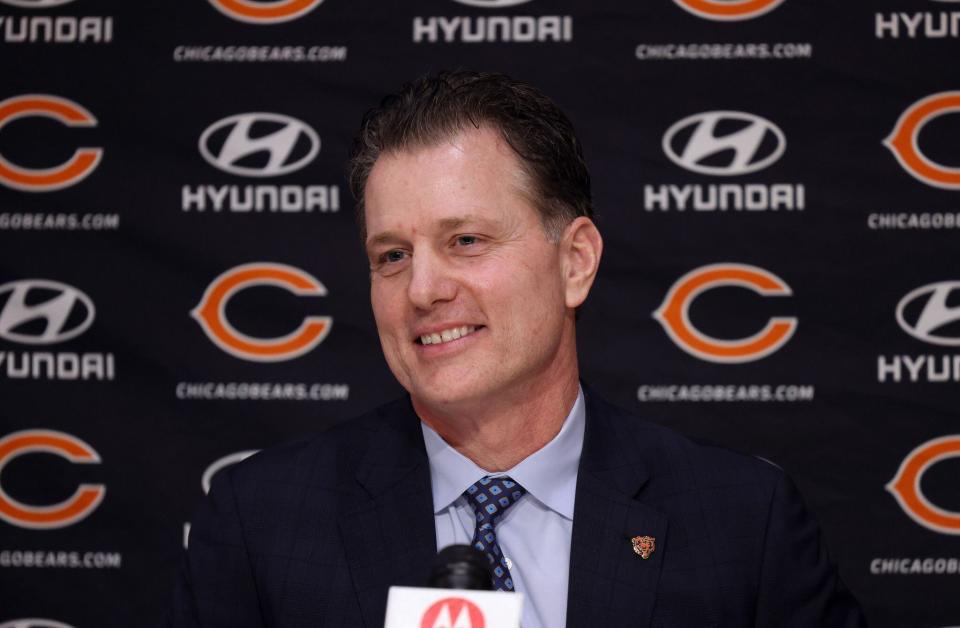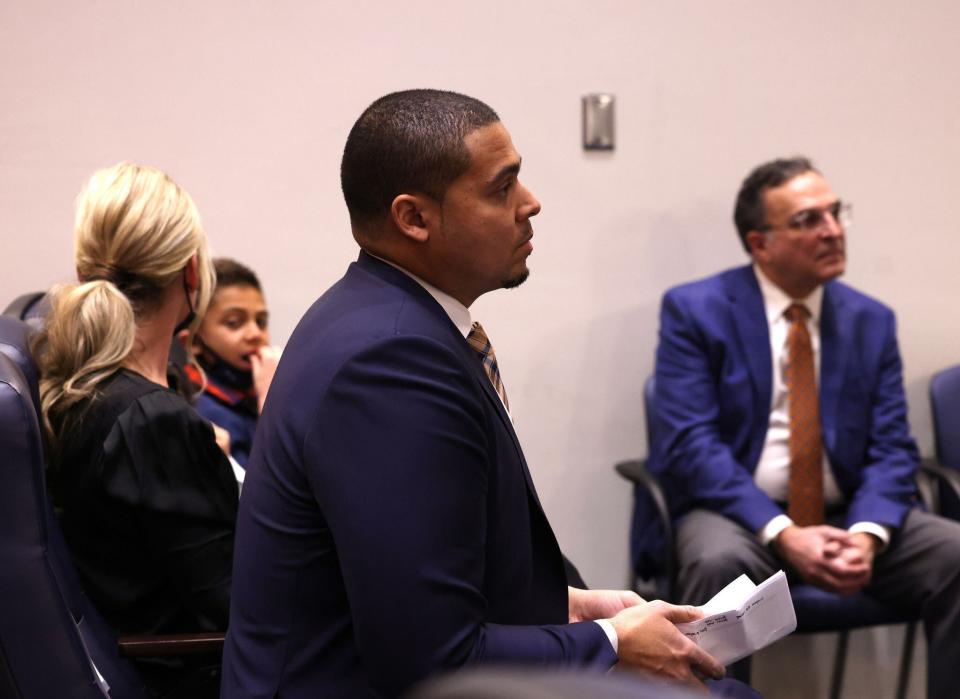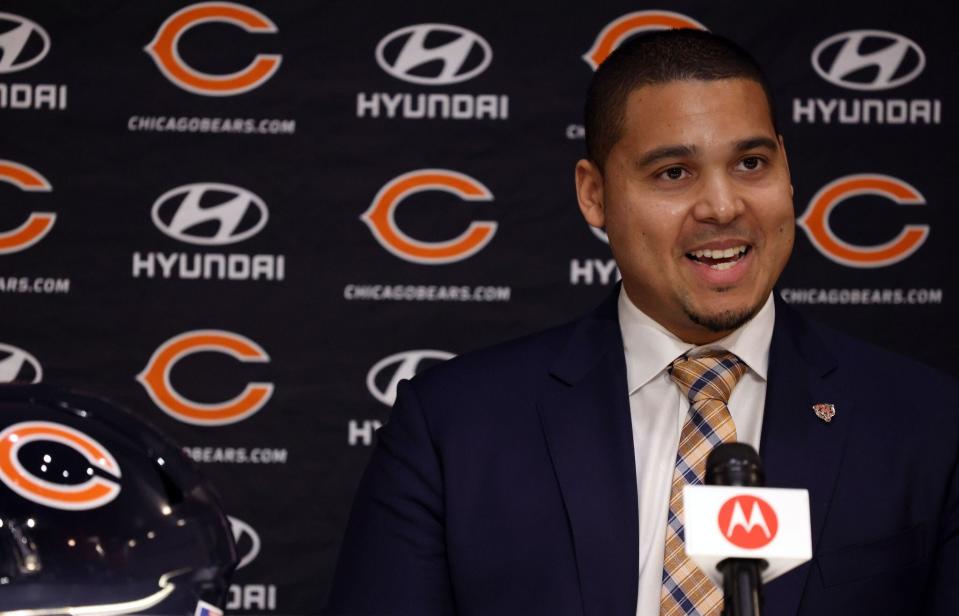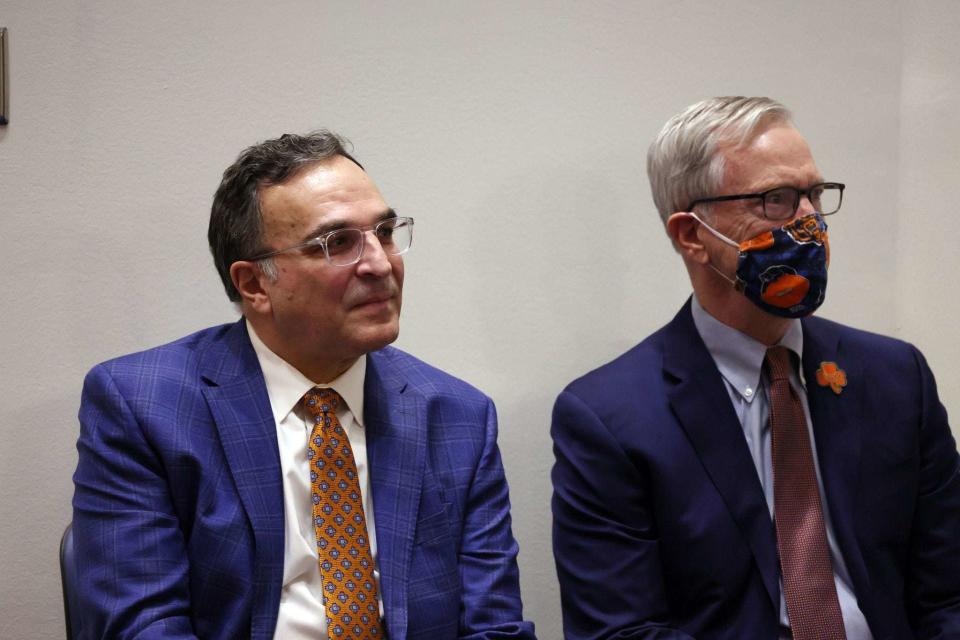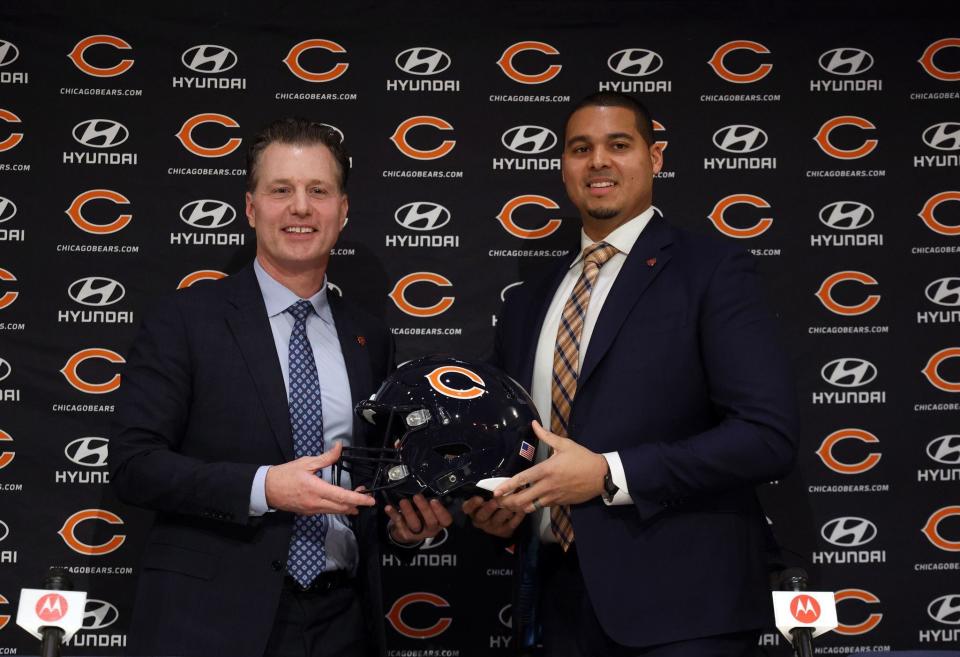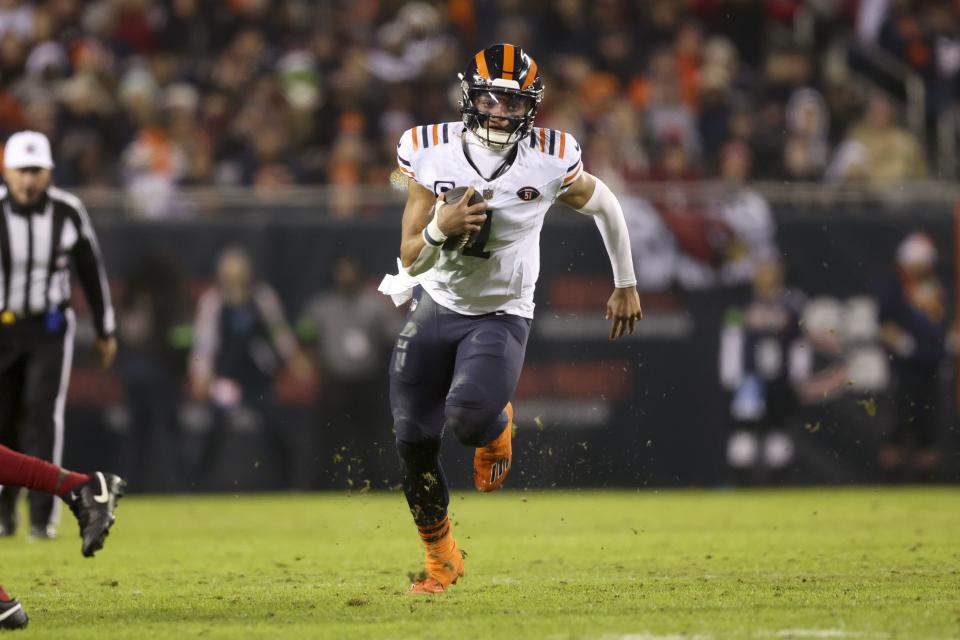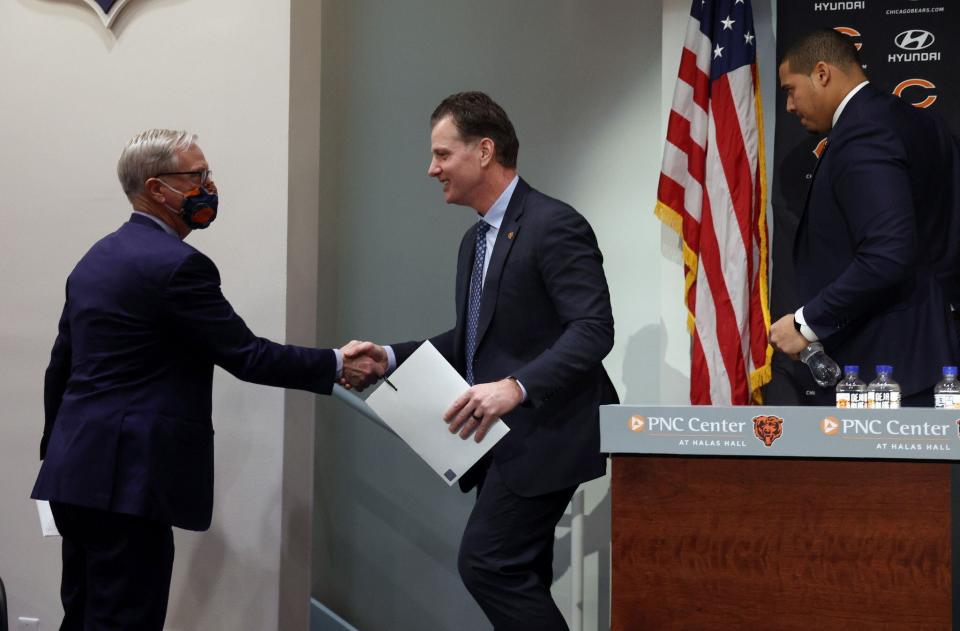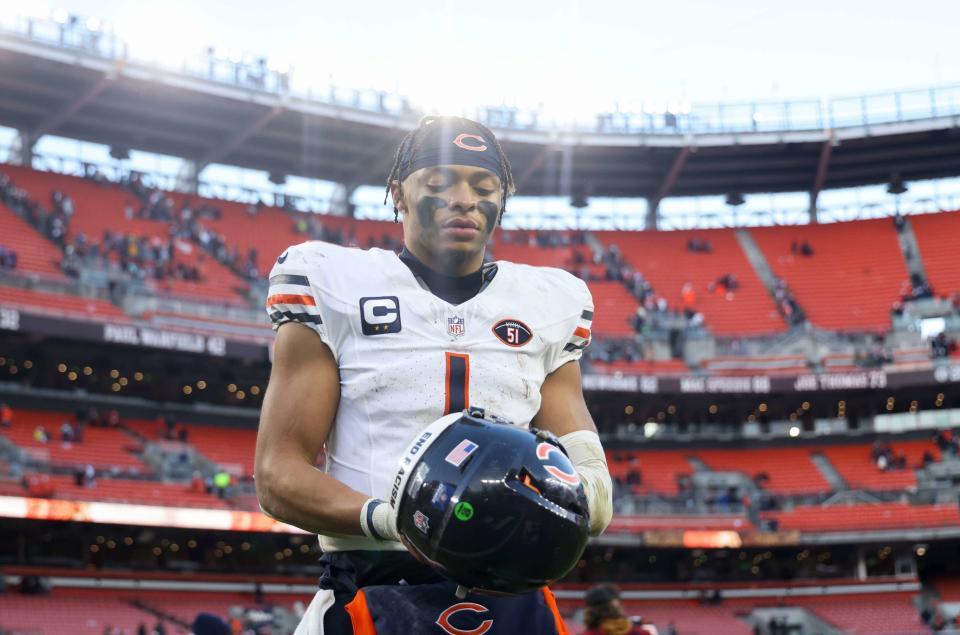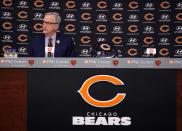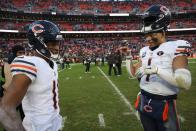Justin Fields knows there’s a typical timeline in the NFL. The Chicago Bears QB thinks he’s ‘just at the start.’
Two years, eight months and one day ago, Chicagoan Carlos Nelson walked across the NFL draft stage, shook Commissioner Roger Goodell’s hand, removed his mask and announced the pick.
With the 11th selection, the Chicago Bears were taking Ohio State quarterback Justin Fields.
Masked-up Bears fans at the first in-person draft after the emergence of COVID-19 cheered, and NFL Network analysts heaped praise.
“This is an exciting moment here for the Chicago Bears,” analyst Daniel Jeremiah said. “This is a team that has a pretty good defense in place. They just didn’t have any juice. There was no excitement on this offense. … He’s going to give this Chicago Bears team something they don’t have, and it’s going to be a lot more fun to watch.”
Charles Davis cued up the comparison: Dallas Cowboys quarterback Dak Prescott. Davis cited the body and arm, the ability to move around and extend plays, the adaptability and toughness.
After decades of searching for a franchise quarterback, the Bears might have found the player to break through the mediocrity.
Fast-forward through a challenging rookie season under a lame-duck coaching staff. Through a general manager and coaching change. Through more growing pains in a second season with a stripped-down roster. Through the second-best rushing season by a quarterback in NFL history with 1,143 yards. Through 6,258 passing yards and 39 touchdown passes over 36 starts but also 30 interceptions, 127 sacks and an 81.4 passer rating. Through a social media movement anointing H1M. Through a dislocated right thumb throwing off incremental progress in Year 3. Through endless outside debate about whether the Bears offensive struggles are the fault of the coaches or the quarterback.
And we get to Friday afternoon at Halas Hall, two days before what potentially could be Fields’ final start at Soldier Field for the Bears.
At his locker after practice, Fields considered how all of that had been jammed into the start of his career, which now hinges on a crucial Bears decision. And he summed it up with a familiar conclusion, one he has offered before in a wild season: “God doesn’t make mistakes.”
“It’s been tough,” he said. “My situation has been different than others. But I wouldn’t change it if I had the option to. I’ve learned a lot. I learned a lot of football. ... And I learned a lot of life stuff too. My journey has definitely been different, but I’m on this journey for a reason.”
Entering the Week 17 game against the Atlanta Falcons, Fields and the Bears have won three of their last four games to double their three-win total from 2022 under coach Matt Eberflus.
By most accounts, Fields has made steps toward becoming the type of quarterback the Bears can win with. Interceptions and sacks are down since he came back from the thumb injury Nov. 19. He has closed out some wins. He has had flashes of improvement in his movement within the pocket and his willingness to pass downfield rather than always tuck and run when the pocket breaks down. And he has continued to show his unique ability — unlike few others in the NFL — to extend plays with his legs.
But is that enough to convince the Bears to bet on him again?
General manager Ryan Poles is a bad Carolina Panthers finish away from securing the No. 1 draft pick he obtained in the trade of last year’s No. 1 pick. A highly touted quarterback draft class, led by USC’s Caleb Williams and North Carolina’s Drake Maye, awaits this spring. And questions remain about whether Fields — who ranks 23rd with 195.1 passing yards per game this season — can become the quarterback to lead the Bears toward their Super Bowl hopes.
All of those factors lead to more questions as the Bears head toward their final home game of the season Sunday and then their finale against the Green Bay Packers at Lambeau Field.
Could this really be it for Fields with the Bears? Is Poles ready to switch gears toward the development of a new quarterback? Or will he give Fields more time?
Fields, who is just 24, truly believes he will become the quarterback he wants to be, whether it’s in Chicago or elsewhere.
“With my work ethic, with the tools that God has blessed me with, I’m going to get there one day,” Fields said. “That’s why I’m not necessarily worried about whether I’m here or somewhere else next year. God blessed me with amazing tools — a talented arm and legs that I can use to run away from guys. And I’m smart, too, learn from my mistakes. With the way I work, with the way I love this game, I’m going to get there one day.
“And I haven’t even touched it. People put a timeline on whether they can judge guys, but I’m really just at the start.”
But that’s the way quarterback opportunities in the NFL often go — in a blink.
On a timeline
For the record, Fields hopes he stays in Chicago, listing as his first reason his relationships with teammates.
“It’s a blessing being here,” he said. “Chicago is a great football city. So if I got to choose, I wouldn’t want to go anywhere else.”
The choice, of course, is very often not up to the player.
About three years ago, Chicago was asking the same questions about a different quarterback, though Mitch Trubisky’s exit was more prolonged.
By the end of Trubisky’s third season in 2019, Bears GM Ryan Pace and coach Matt Nagy were clearly unhappy with his play but didn’t have the same draft resources the team does now, having traded away their 2020 first-round pick for Khalil Mack. So they traded a fourth-round pick for Nick Foles and made Trubisky compete with Foles. That set up an odd 8-8 playoff season in 2020 that convinced Chairman George McCaskey and President Ted Phillips to give Pace and Nagy another year — and the opportunity to draft another quarterback: Fields. (More on that later.)
Wide receiver Darnell Mooney remembers watching that mess unfold with Trubisky, Foles and players such as wide receiver Allen Robinson, whose production rapidly deteriorated in 2021.
“It was crazy to see,” Mooney said. “I’m looking at A-Rob’s situation. I’m looking at Mitch and Nick’s situation, and I’m like, ‘Damn.’ … Eventually you’ll be in it, and you just have to figure out a way how to handle it.
“(Justin) has handled it well. He’s not looking at it as if, ‘I’m not going to be here.’ He’s looking at it like, ‘I’m here, and this is my team.’ ”
First-round quarterbacks are often quickly in such situations. But if Fields is given only three seasons with the Bears, it would be fast even by the NFL’s “Not For Long” track record.
Take a look at the 32 quarterbacks drafted in the first round from 2011, when the new collective bargaining agreement initiated a fifth-year option for first-rounders, to 2020, the most recent group to have its options picked up or declined.
Only seven of them didn’t make it past Year 3 with the teams that drafted them: Dwayne Haskins, Sam Darnold, Josh Rosen, Paxton Lynch, Johnny Manziel, Brandon Weeden and Blaine Gabbert. That list is at eight if 2021 No. 3 pick Trey Lance, who was traded after Year 2, is included. Of those quarterbacks, only Darnold and Gabbert went on to start more than five more games in their careers thus far.
Of the remaining 25 first-round quarterbacks, including Trubisky, several were already on their way out as starters after three seasons, with seven more leaving the teams that drafted them after Year 4.
Many of the teams that kept their first-round picks around weren’t staring down the possibility of owning the No. 1 pick for the second straight year with a crop of highly touted quarterbacks available in the draft, like the Bears are. Darnold and Rosen were among the casualties of teams with high first-round picks, which netted the Jets Zach Wilson and the Cardinals Kyler Murray.
Bears tight end Marcedes Lewis, an 18-year NFL veteran, spent the first 12 years of his career with the Jacksonville Jaguars, who cycled through quarterback after quarterback, including Byron Leftwich, David Garrard, Gabbert and Blake Bortles, to name a few. He learned quickly about how “economics” played into the cycle. Because of the league’s contract structures, a team hopes to figure out whether to pay a quarterback after three or four seasons, and many times it’s cheaper or easier or more beneficial to the regime — or of course smarter — to move on.
Speaking generally, Lewis said he thought three years of being a starter was enough time to figure out what a player at any position is going to be.
“They’re not expecting you to be All-Pro after three years, but I think that’s enough time to figure out who you are as a player, on and off the field, the value you bring,” Lewis said. “If you’re one of those guys (who plays right away) and you’re playing for three years, you have enough time on task, you have enough tape out there to figure out, ‘OK, when I turn on the film, I know what I’m getting out of this person. He’s not up and down. I know who this guy is going to be five, six years down the line.’ ”
But being in the position he’s in now, Fields wondered about some of the quarterbacks that didn’t make it with their teams, noting how Aaron Rodgers sat behind Brett Favre for three years before his rise to one of the best in the NFL.
“I get it, the whole try to put a timeline on guys, three to four years. But everybody is different. Everybody matures differently,” Fields said. “That’s just the world we live in. Everyone wants to see stuff happen so quickly. But honestly, I feel like some guys in the past, maybe if they weren’t given up on so fast by the organization or the fan base or their teammates, they would have grown into a better player.
“It’s just a tough position because they might have let those thoughts seep in, of, ‘Maybe I’m not good enough.’ But the thing about me, I’m not going to let that sink in. Because at the end of the day, I know how talented I am. I know God has blessed me with gifts that not many people have, so I’m going to just keep using those gifts to get the most out of them.”
‘I got what I got’
Bears offensive coordinator Luke Getsy called it “an intense question,” the type of big-picture topic a coach with the Falcons on his mind will reflect upon when the season is up.
But the Bears have intense decisions ahead, ones that will affect the careers of players and coaches, and the question gets at the crux of their direction. What is Getsy’s assessment of his progress in molding his offensive system around Fields?
Getsy said he would think about such things after the season before adding: “There’s been a lot of really cool progress throughout the offense, and I think Justin’s been a part of that.”
The topic was brought up in a different manner to Fields at his weekly news conference. Have the Bears given Fields everything he needs to be successful?
Fields answered with a simple, “Yes,” but didn’t have much interest in expanding when asked to do so. The topic is nuanced, and Fields explained later he didn’t want to offer an answer that would become clickbait. And Fields, who has referenced his faith often when discussing such matters, also knows exploring that topic is not going to change anything.
“At the end of the day, I’ve been given what I’ve been given, and that’s that,” Fields said. “I’m going to try to do the most with what I’ve been given. Some teams, like the Eagles, they have a star offensive line, star defense, two star receivers, a star running back. Every situation is different on every team in the league. … Of course everybody could have been put in a better position. But I got what I got, and I got it for a reason, so we’ll just see what the future holds after these next two games and see what happens next.”
The answer, when looking at Fields’ full career with the Bears, is that he didn’t have everything he needed — not the whole time.
Pace drafted Fields into a situation in which Nagy felt pressure to win, so Nagy prepared to start veteran Andy Dalton. When Dalton got hurt in Week 2, the Bears threw Fields into the fire the next week in that notorious nine-sack first start in Cleveland. Fields’ progress after that was slow, and he missed five of the final seven games of the season with injury and illness.
When the Bears changed course at GM and coach to Poles and Eberflus after that season, Fields had to learn a new offense and play with a subpar, often-injured offensive line and a wide receivers corps without a true No. 1 in 2022, and he often took it upon himself to try to make plays. Meanwhile, the offense under first-time play-caller Getsy took time to click and accentuate Fields’ athletic strengths.
Quarterbacks are expected to rise above such challenges, but those factors must be considered when evaluating Fields’ path nonetheless.
So the better question is probably more focused: Did the Bears give Fields what he needed to succeed this season? Are the plays that have gone wrong more often the result of Fields’ execution, Getsy’s design or call or a teammate’s failing? With a better offensive line, a top receiver in DJ Moore and a second year in Getsy’s system, did Fields show enough progress in Year 3 to make Poles believe his rise will continue under this or another coaching staff?
Fields addressed the quarterback-or-coach debate by saying, “It can be both.”
“Neither of us are perfect,” Fields said. “Luke’s not always going to call the perfect play. I’m not always going to make the perfect read. … There have been plenty of plays where Luke called a bad play, I scrambled and we scored a touchdown and everybody was all good. And there’s been plenty of times where Luke has called a great play, and either I didn’t execute it well or somebody didn’t execute it well. One person didn’t do their job and the play is messed up. So it’s both.”
The two sides
The dichotomy of the Fields debate was shown in back-to-back plays Sunday against the Cardinals.
On third-and-10 early in the fourth quarter, Fields felt pressure on his left side and escaped toward the right sideline. He got to the edge past two defenders, then squeezed through two more for a 39-yard gain to get the Bears to the Cardinals 14-yard line.
It was part of a 97-yard rushing day for Fields, his second-best output on the ground in a season in which he has improved, per coaching directives, in looking to pass first after leaving the pocket. His 585 rushing yards this season, while well below his franchise-record-breaking year in 2022, are second among quarterbacks behind Lamar Jackson’s 786.
That was a prime example of something Fields does that few other quarterbacks can.
On the next play, though, Fields lofted a pass to Khalil Herbert in the left corner of the end zone, but he said he didn’t drive it enough to Herbert, and safety Jalen Thompson dropped off in coverage of tight end Robert Tonyan to grab an interception.
It was Fields’ 16th fourth-quarter interception in his career out of 30 total and sixth in the final quarter this season. His fourth-quarter passer rating is 60.6 for his career and 50.2 this season, according to Pro Football Reference.
That was a prime example of one of the big concerns that remain with Fields, one some evaluators hold as a red flag as far as Fields’ potential.
Before Fields returned from his thumb injury, Eberflus told him to think of the number 200, representing two touchdowns, no sacks and no interceptions each game. That’s what the Bears wanted him to strive for.
Take out two interceptions on Hail Marys in the Browns game, and the Cardinals’ pick was the only against Fields in the last five games, but he has had five fumbles. He has had a passing and a rushing touchdown in two of the five games. And he hasn’t taken more than three sacks in any of those games.
“It’s a testament to him, how he’s getting the ball out, how he feels the progression, how he’s feeling the rush, without just ditching it for no reason too,” quarterbacks coach Andrew Janocko said of the lower sack numbers.
Getsy and Janocko pointed to plenty of other things beyond the turnover and sacks stats that have been better. They said Fields has improved at going through his progressions, with his footwork, at setting protections, at throwing the ball accurately and at extending plays by both throwing and running.
But that progress hasn’t been big enough yet to elevate the Bears passing game to a new level — because that’s where Fields would become truly dangerous, if he could consistently be a big-play threat on the ground and in the air.
The Bears rank 28th with 182.6 passing yards per game and 27th with 5.89 yards per pass play. Fields threw for 35 yards in the second half against the Cardinals, looking hesitant or inaccurate on a handful of throws. Through 36 starts, Fields has surpassed 200 passing yards 12 times.
Some argue that what Fields produced in that Cardinals game — 267 total yards — might be enough. He’s averaging 248 total yards per game this season. But some opponents can contain his running abilities better than the Cardinals. The downfield passing game needs to be better, Eberflus said.
“If it’s (ranked) 27, it’s not where it needs to be, right?” Eberflus said. “We’ve got to just continue to work on that. It’s got to get the downfield, explosive throws. How you score in the NFL is to get explosive passes and explosive runs. … We’ve got to get some of those explosive passes. We had a few but we need to get more.”
And so it goes back to not only the quarterback-coach debate, but also the question of whether one of the quarterback draft prospects would be better suited to getting the Bears where they want to be.
“Everyone knows it’s a quarterback-driven league. Those decisions are big,” Poles said on the team’s pregame radio show on WMVP-AM 1000 last week about QB contract decisions in general. “They’re impactful, and they can move the organization in the right or wrong direction. So you have to be really well-researched and making sure you’re making good decisions going through the whole process. And the other part of that is putting guys in position to be successful as well. Huge all-around organizational decisions and development plans for those guys.”
‘No point in stressing’
Janocko’s wife picked up the Christmas sweaters for the Bears quarterback “family picture” this month. Fields’ sweater featured Surfer Santa, an apt choice given the Zen that has been required to navigate a season in which his future has been a frequent topic of speculation.
Janocko, however, used a different holiday example when asked how Fields has dealt with the noise.
“Sometimes I do ask him to be Buddy the Elf on Wednesday morning, and he has to be,” Janocko said, referencing the relentlessly positive main character in “Elf.” “But that’s part of the job, and he embraces that. Feeling good, feeling bad, when it’s time to get back to work, you get back to work.”
Fields said he is simply too consumed by his daily work to fret over his situation.
“I’ve got too much to focus on today to worry about tomorrow,” Fields said. “I’ve got to worry about this new game plan I’ve got, the play calls, and like I always say, we don’t know if we’re going to get it tomorrow. So there’s no point in stressing about tomorrow if we don’t know it’s going to be here yet.”
Fields’ work ethic never has been a question. That and the way Fields has carried himself under such scrutiny is undoubtedly part of what makes his teammates offer up their votes of support when asked about the Bears decision.
“He’s doing everything the right way,” Mooney said. “He’s not being a distraction. You don’t hear Justin’s name in a negative way at all. If you’re drafting a quarterback or bringing somebody else in, you’re starting all the way over.”
Mooney also said he thinks if Fields doesn’t stay in Chicago “he’ll be somewhere else balling.” Lewis pointed to more about why he thinks Fields has potential to continue to rise.
“He’s a unique athlete,” Lewis said. “He can throw the skin off the ball. There are only a few that can run with the ball like he is and he has. And I think what makes him special is his ability to adapt and his will to want to be better. He wants to learn and be great.”
Those factors have contributed to the great Chicago divide when it comes to Fields — and have fueled the fear among some fans that if the Bears let Fields go, they might regret it.
Fields, however, seems to be channeling that Zen energy about what the future holds.
“It’s my journey,” Fields said.
Could that journey really be headed away from Chicago already?
